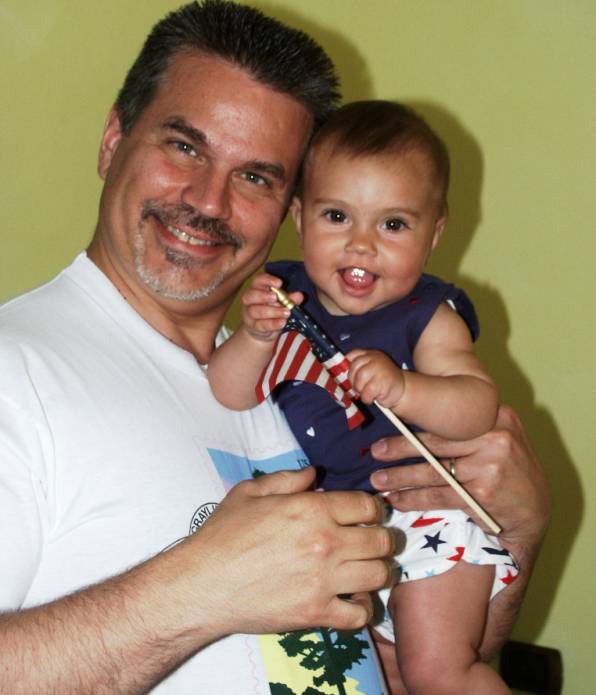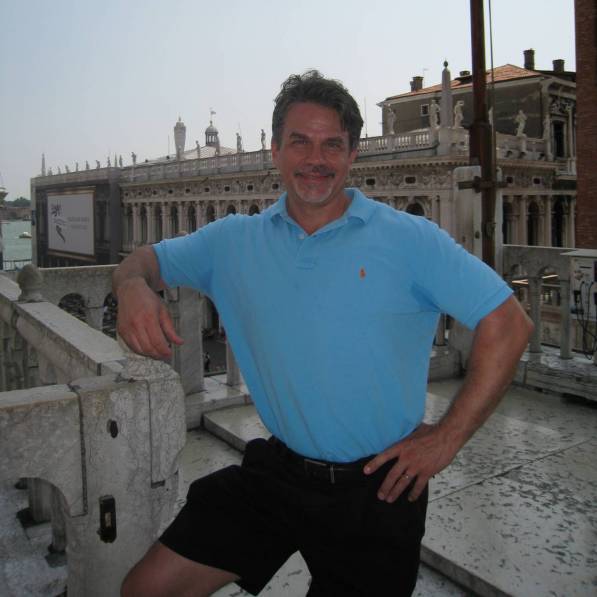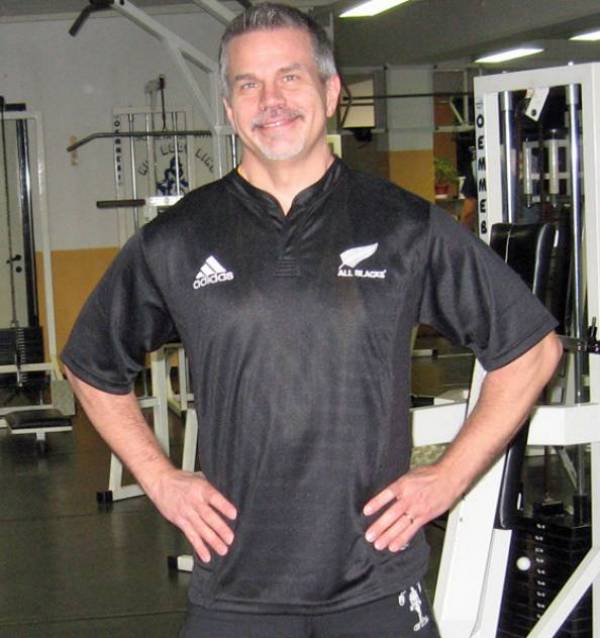Peter Blynn’s travel schedule made it tough to find time for workouts and to eat right. Precision Nutrition Coaching gave him the tools to master these challenges — and left him 33 pounds leaner and $25,000 richer.
Peter's Transformation
Lost 33 lbs and 11% body fat!

- Age: 52 years
- Weight Lost: 33 lbs (from 180 lbs to 147 lbs)
- % Body Fat Lost: 11% (from 18% to 7%)
- Waist Inches Lost: 5 inches (from 35 inches to 30 inches)
The yo-yo effect
Peter Blynn was an expert on getting into shape. Over his lifetime, he must have started at least 25 different workout programs. Trouble was, he’d also stopped.
So he fell into a kind of cycle. Fit and lean for a few months … less fit and fatter for a few more. A new program would grab his attention, and he’d try that one. Then life would get in the way, and he’d quit working out. “I did it so often it was almost a joke,” he says.
Except, as he got older, the joke got a little less funny. Once upon a time, Peter could drop fat easily, and even gain muscle without extraordinary effort. But now, at 52, his old methods weren’t working. Now, it took him twice as long to get the same results — and with his busy schedule and family life, it was harder and harder to maintain improvements.

Tips from a road warrior
The father of two young girls, Peter lives in Italy and holds a demanding position in an international company that requires him to travel on an irregular schedule across three continents — Europe, the Middle East, and Africa. On Wednesday, he might be told to pack for a Sunday flight to Dubai. “Then on Friday, they might tell me I’m not going after all … or I might be going to London instead.”
Who wouldn’t be challenged to stick to a workout schedule under those circumstances? Not only that, but like so many of us, when he’s stressed, Peter eats. And eats. In fact, at one point, he was gaining a kilo a month. He was living in Belgium — the land of frites with mayonnaise — and regularly making site visits to his client’s 25 offices in 22 countries. He was working late, staying at the office, ordering fast food for himself and his team — and gaining even faster.
No wonder when he got serious about weight loss, he felt the need for a little support. In Precision Nutrition Coaching he got it. And now that he’s completed the program, this expert road warrior has a few tips to share with those who are just beginning their journey.
Budget isn’t always best.
As someone who works in the computer industry and who is involved in healthcare systems, Peter was comfortable with the Internet. And traveling as much as he does, he was drawn to the idea of online coaching.
Three years ago, researching his options, he came across two. One of them was free, and one of them — Precision Nutrition Coaching — involved a cost. So he did what most of us would do. He signed up for the free course. “That,” he says now, “was a mistake.”
“If there’s one thing people should know, it’s that you get what you pay for.” It’s not that the other program was completely useless. The exercise component was pretty good. And Peter did lose some weight. “But the diet … the diet was secondary. And as I went through it, I started to understand that exercise wasn’t enough. I needed to put nutrition first.”

Pick your route, and stick to it.
Growing up in Pennsylvania, Peter had learned the importance of good nutrition from his mother, a home economics teacher. “The truth is, I probably knew ¾ of Precision Nutrition Coaching’s dietary recommendations before I started,” he says. And for months before he enrolled, he’d been trying to follow Precision Nutrition Coaching practices, like loading up on veggies, choosing lean protein, and limiting processed foods.
As a result, he’d lost what he calls “the easy weight” before the program even started. “But the secret to losing weight and maintaining a healthy weight is consistency,” he says. “That’s what was lacking for me, in the past. I didn’t stick with anything for long.”
Consistency means keeping yourself accountable. It also means persisting when the going gets tough. And for someone in Peter’s position, that was bound to happen.
Resist your conditioning. Try something new and different.
One of Peter’s first hurdles was learning to stop eating before he was full.“What’s 80% full? How do you measure that?” I can hear the frustration in his voice even now, as he remembers how difficult this lesson seemed. “For a while, it drove me crazy!”
Like many of us, Peter was fighting against some pretty powerful conditioning. “Clean your plate,” he quotes. “Remember that saying? That’s what we were always told as kids.” He sighs. “I understand why our elders said that. The world was a different place back then. It’s just that … well … let’s just say, that kind of advice leads a lot of people into trouble.”
The fact is, even though his mom had taught him well, there were some lessons he needed to un-learn for the sake of his health. Now Peter recognizes it’s not so much that his mother was wrong. It’s just that the typical North American plate has changed a lot — for the worse — since that saying first came into use.
Even in Europe, where portions are generally smaller and processed foods less common, people often eat more than their bodies need. In the end, he’s learned that he doesn’t have to ignore his mother completely. It’s still okay to clean his plate — providing he chooses a smaller one, and loads it with the right foods in the right proportions.
When in Kiev, don’t do as the Kievans do.
Travel can be exciting. Travel can be educational. Travel can be enriching. But let’s face it, travel can also be exhausting, especially when you’re doing it for work instead of for fun. Not only that, but it can seriously interfere with a person’s fitness goals. In some parts of the world, fat loss is not exactly part of the cultural program.
Take Kiev. There, Peter reports, a favorite delicacy is lard. “Lard!” I can hear the amazement in his voice, even from a distance of 4,000 miles — or is that 6,400 kilometers?
He’s referring to salo, cured fatback or pork belly, often eaten raw and sometimes, cooked with garlic and herbs. “They serve it to you as an appetizer, three or four different ways. Plain. Paprika. Smoked. Maybe some with skin. A whole plateful of the stuff.” It comes with the dark multi-grain bread of the region. And vodka. Not a glass of vodka, mind you. A bottle. “I tried it,” he says. “I ate a little.” He drank a bit of the vodka, too.
On Peter’s first trip there, he didn’t have much choice. He didn’t know the local food choices and didn’t want to offend his hosts. He’s diplomatic in his description. “Overall, the quality of the food in the restaurants [in Kiev] is not what someone living in Italy is used to.”
But one trip was all it took to teach him what to do before the next one. Now, when Peter travels, where food choices are limited to unhealthy ones, he avoids the local food. “Most cities have at least one international Italian restaurant,” he explains. “You can always get grilled fish or meat and vegetables there. It won’t be cheap. But it will be healthy.”

Pack heavy … and light.
Besides picking restaurants carefully, Peter learned to bring a portable roller for stretching and a cooler bag filled with healthy snacks. Sure, that added to his baggage, but he made up for that in other ways. “Vibrams,” he whispers, like he’s sharing a secret code word. “They pack down flat. Take up less room than conventional shoes in a suitcase. And, bonus: They’re designed by a company not far from where I live!”
Plan your itinerary.
Most continental European hotel gyms do not, in Peter’s experience, resemble North American hotel gyms. “You’ll be okay in England. You can get lucky in Scandinavia and Benelux. But forget about Paris!” In fact, in some countries, the phrase “hotel gym” is a contradiction in terms. Hotels are about featherbeds, not about swinging kettlebells.
And even where gyms exist, the facilities are often less than adequate. Or the hours of operation are inconvenient. So Peter has learned to scope out the locations of alternate facilities. And now, wherever he goes, he takes pictures of the equipment and makes a note of opening hours. “That way, if I go back there, I’ll be prepared and know exactly where to go to get my workout.”

Be flexible if plans must change.
Considering the extra barriers he was facing, Peter’s compliance with the workout schedule during Precision Nutrition Coaching was nothing short of remarkable. “I had to be flexible moving workouts between days of the week. Overall, I may have missed four workouts,” he says. Four workouts. Over an entire year.
But here’s the kicker: Two of those workouts fell during the week before his final progress photos were due. The scene: Copenhagen, one of the healthiest cities in Europe, a place where 36% of all citizens commute to work by bicycle. His company had booked him into a boutique hotel near the World of Health IT Conference & Exhibition he was attending. Like many similar hotels, it did not have a real gym, he says. “Just several aerobic machines and a hi-definition television.” No problem, he figured. After all, there was a gym down the road that he’d used quite a few times in the past. In fact, at one point, when he’d been working in the city more regularly, he’d even been a member.
But when he got to the gym’s reception area at 6:30 in the morning and asked if he could train there, the receptionist told him he was in arrears. Even though he’d officially withdrawn, they’d never cancelled his membership. Now the company wanted six months of back dues before they’d even let him in the door! One week until final photos were due. One last week to give the program everything he had. And now he couldn’t work out? “Psychologically, that was a bit of a disaster,” he says.
Even worse, during the time he’d been away, this company had grown. They now owned half the gyms in Copenhagen! Another person might have given up. But not Peter. Instead, he shifted gears, jogged back to the hotel and did an aerobic workout. It’s that kind of focus and drive that made him a winner.
Peter is modest about his achievements in the program.
“I didn’t have as much weight to lose as some,” he says. “I was already familiar with working out. If anything, the exercises were too easy for me, so that gave me a head start.”
“My mom had taught me the importance of a healthy diet.” “My wife was very supportive and is a firm believer in whole natural foods that are locally grown and in season.” “It’s easier to stick with whole foods in Europe because the supermarkets aren’t as full of the processed stuff.”
True, true, true, true, and true. But Peter faced challenges of his own that would have defeated many others. And in the process of overcoming them, he picked up tools to help him end the constant cycle of weight loss and weight gain that he’d been caught in for so long. Maintaining a stable weight is part of maintaining health.
And since he’s become a father, health is more important to him than ever. Not only does he want to set a good example to his girls, but he also has to keep up with them! I ask him if there’s anything more he’d like to convey to potential clients. “You get what you pay for,” he says again. I know he means that this was a journey worth taking.
Want to read more great stories like Peter’s? Then come meet a few other men, women, and couples who lost weight, started eating better, and took control of their health.
Want help finally getting the healthy, energetic body you’re after?
For many people, improved eating and lifestyle habits can seem impossible to sustain, especially when progress feels non-existent. What the experts know: Progress is always happening, you have to know what to look for.
That’s why we work closely with Precision Nutrition Coaching clients to help them stay energized and motivated, and get in the best shape of their lives… no matter what other challenges they’re dealing with.
It’s also why we work with health and fitness pros (through our Level 1 and Level 2 Certification programs) to teach them how to help their own clients recognize progress and stay motivated through the same challenges.
Interested in Precision Nutrition Coaching? Join the presale list; you’ll save up to 54% and secure a spot 24 hours early.
We’ll be opening up spots in our next Precision Nutrition Coaching on Wednesday, July 9th, 2025.
If you’re interested in coaching and want to find out more, I’d encourage you to join our presale list below. Being on the list gives you two special advantages.
- You’ll pay less than everyone else. At Precision Nutrition we like to reward the most interested and motivated people because they always make the best clients. Join the presale list and you’ll save up to 54% off the general public price, which is the lowest price we’ve ever offered.
- You’re more likely to get a spot. To give clients the personal care and attention they deserve, we only open up the program twice a year. Last time we opened registration, we sold out within minutes. By joining the presale list you’ll get the opportunity to register 24 hours before everyone else, increasing your chances of getting in.
If you’re ready to change your body, and your life, with help from the world’s best coaches, this is your chance.
[Note: If your health and fitness are already sorted out, but you’re interested in helping others, check out our Precision Nutrition Level 1 Certification program].


Share